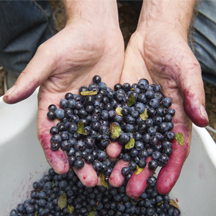
Forging a Healthy Partnership
Students in a University of Maine communication class assigned to study how to effectively share information about and attract volunteers to support seasonal farmworker health also learned a great deal themselves.
Visiting assistant professor Karen Hutchins Bieluch says students participating in the service-learning project with Maine Migrant Health Program (MMHP) officials gleaned a deeper appreciation for seasonal farmworkers and the important role they play in the state’s economy.
They also learned a lot about MMHP — the state’s lone farmworker health organization that annually tends to 1,200 patients and offers mobile medical care at farmworker camps. MMHP providers who speak Spanish and Creole are among the professionals who travel around the state to intersect with workers harvesting everything from blueberries to boughs for wreaths.
Senior wildlife ecology major Matthew Owens McCullough says the project was educational, rewarding and humbling.
Bieluch says students in the small group communication class also discovered a thing or two about their individual interaction approaches and processes involved in small group decision-making, problem solving and negotiation.
“Working on the project helped them understand their communication styles, such as how they handle conflict,” says Bieluch. “Do they shy away from it or address it head-on?”
McCullough, from Gorham, Maine, says his communication style is straightforward.
And he recommends the approach for others. “Don’t keep any of your skills hidden, they can be very important during the process of developing project goals,” he says. “Some skill you don’t consider applicable may spark an idea for somebody else and end up being the driving factor in the success of the project.”
In addition, Bieluch says the project provided an opportunity to contribute to, and build a partnership with, a Maine-based community organization.
“While service-learning courses require significant amounts of preparation and coordination, they often provide students with a richer, applied learning experience, while also giving back to the citizens of Maine who support higher education in Maine,” she says.
Class members divided into three groups for the hands-on endeavor. One group evaluated MMHP’s website (mainemigrant.org), another focused on the organization’s PowerPoint presentation and another critiqued its brochure.
McCullough was part of the group that evaluated the MMHP website and recommended changes based on answers to an online survey. “The most-popular change requested by people was identifying the mission statement,” he says. MMHP’s mission is to “improve the health status of migrant and seasonal farmworkers and their families by providing culturally appropriate care and services.”
The website group also recommended rearranging some information and provided a flow chart for effective website design and presentation. Students said the website had a number of positives, including color scheme, photographs, testimonials and use of multiple languages.
In general, Bieluch says students recommended ways to increase Mainers’ awareness of MMHP and how citizens can become volunteers for MMHP.
Migrant workers, say MMHP officials, are sometimes an invisible population. While the fruits and vegetables they harvest contribute greatly to Mainers’ health and the economy, seasonal workers often live below the poverty line in substandard housing, do not have health insurance and due to isolation and language barriers, may not be familiar with available resources.
Linda Silka, director of UMaine’s Margaret Chase Smith Policy Center and a professor in the UMaine School of Economics, recommended the class intersect with MMHP for the CMJ 345 project. Silka, who specializes in building community-university research partnerships, is also on MMHP’s Board of Directors.
Bieluch says MMHP officials appreciated the students’ input. “They [students] felt listened to and that their work was valued,” she says. “And I think that increased the quality of their [students’] work and their learning experience.”
McCullough concurred. “They [MMHP officials] try very hard to provide for immigrant workers and were very appreciative of the analysis of their website we presented,” he says.
